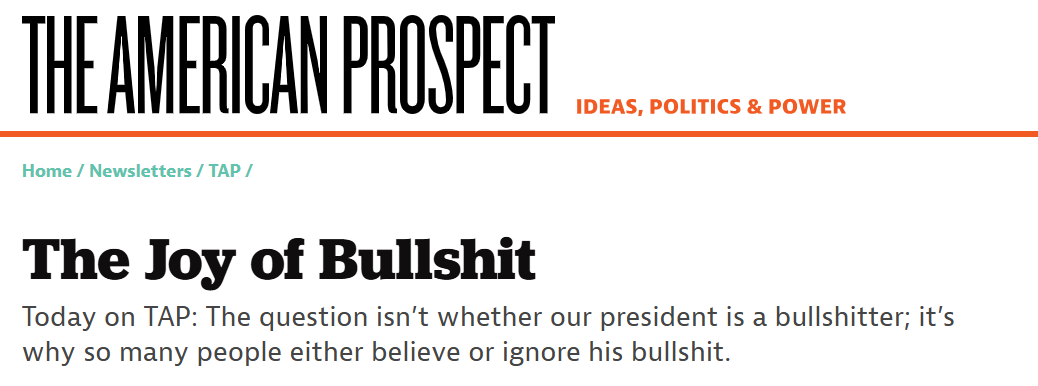Welcome to DU!
The truly grassroots left-of-center political community where regular people, not algorithms, drive the discussions and set the standards.
Join the community:
Create a free account
Support DU (and get rid of ads!):
Become a Star Member
Latest Breaking News
Editorials & Other Articles
General Discussion
The DU Lounge
All Forums
Issue Forums
Culture Forums
Alliance Forums
Region Forums
Support Forums
Help & Search
General Discussion
Related: Editorials & Other Articles, Issue Forums, Alliance Forums, Region ForumsThe Joy of Bullshit

https://prospect.org/blogs-and-newsletters/tap/2025-09-05-trump-joy-of-bullshit/

In 1986, a moral philosophy professor and student of language at Princeton University named Harry Frankfurt published an erudite and witty article in the literary quarterly Raritan, circulation 1,100. Its title was “On Bullshit.” Frankfurt’s point was that bullshitting was fundamentally different from lying. Liars were aware of the truth that they were trying to contradict. Bullshitters simply made stuff up, and tended to believe their own bullshit. “It is impossible for someone to lie unless he thinks he knows the truth,” Frankfurt wrote. “Producing bullshit requires no such conviction.”
About 20 years later, during the reign of George W. Bush, when the bullshit about Iraq was flying thick and fast, an editor at Princeton University Press named Ian Malcolm rediscovered Frankfurt’s essay, and repackaged it as a book. Since the original article was only about 7,800 words, and books are typically at least ten times that length, Martin had to use large type, wide margins, and small pages. The book was marketed to be one of those little books that sit beside cash registers in bookstores. Princeton printed 5,000. The timing was perfect. The book hit number one on best-seller lists, went through several printings, and eventually sold over a million copies. Princeton, sensing another bullshit moment, has just republished a 20th anniversary edition.
In May 2016, when Trump was first running for president, Frankfurt concluded, in an essay published in Time magazine, that Trump was both a liar and a bullshitter. He wrote: “On the one hand, Trump makes false assertions, which he surely knows, or knows he could easily ascertain, to be false. On the other hand, he makes statements of whose truth he is uncertain—and he is indifferent to the fact that he doesn’t actually regard them as true. In the first case, he is telling a lie. In the second case, it’s bullshit.”
Harry Frankfurt died in 2023. I wish he were alive, so I could ask him how he judges Trump’s second term, where the balance seems to have shifted in the direction of sheer bullshit. The American economy is doing better than ever. Slavery wasn’t so bad. Democrats hate America. D.C. is a hellhole of crime. Trump just makes it up. Trump has also made bullshit a way of life in his administration. When RFK Jr. tells Congress that vaccines failed to prevent COVID, he believes his own bullshit.
snip
2 replies
 = new reply since forum marked as read
Highlight:
NoneDon't highlight anything
5 newestHighlight 5 most recent replies
= new reply since forum marked as read
Highlight:
NoneDon't highlight anything
5 newestHighlight 5 most recent replies
The Joy of Bullshit (Original Post)
Celerity
Friday
OP
LoisB
(11,568 posts)1. I had no idea the book did so well. I enjoyed it.
Celerity
(51,802 posts)2. The Truth About Bullshit: On Harry Frankfurt
Princeton University Press
1 Aug 2025 Ideas Podcast
Listen in to a new podcast series, The Truth About Bullshit, hosted by New Books Network editor, Caleb Zakarin.
Named for the famous philosophy treatise by the late Harry Frankfurt, The Truth About Bullshit podcast seeks to illuminate our world and the pressing issues therein by calling out ‘bullshit’ – a misrepresentation of truth – in all its forms. We’re excited to introduce a short series of interviews with experts on fields ranging from AI to business, to politics.
Twenty years ago, Princeton University Press published a short volume with an excellent title: On Bullshit. Written by philosopher Harry Frankfurt, On Bullshit was adapted from an essay that explored the meaning, uses, and consequences of bullshit.
At just 80 pages, On Bullshit became a favorite of readers, selling over 1 million copies and spending 27 weeks on the New York Times bestseller list. It’s not often that a work of philosophy breaks through to the mainstream, but readers of On Bullshit quickly discover why. Harry’s meditation on the meaning of bullshit can be read in one sitting, but the ideas have staying power. After you read Harry’s book, you start to see bullshit everywhere and recognize it’s uniquely pernicious effects on whatever’s left of the public square. Harry wrote his book long before modern social media and AI-generated slop. He was unbelievably prescient, making On Bullshit required reading for today. Harry sadly passed in 2023 at 94 years old, but his ideas live on. In this series, we’ll speak with scholars whose lives and work have been influenced by Harry and his seminal book.
We kick things off with Pamela Hieronymi, one of Harry’s former students. Pamela is Professor of Philosophy at UCLA and a leading scholar in the field of moral philosophy. Like Harry, her work has resonated outside the academy. She served as an advisor on the sitcom, The Good Place, which brought philosophical concepts like the trolley problem to a mainstream audience. For the first episode in the series, Pamela will introduce readers to both the book and the man who wrote it. In subsequent episodes, we will speak with other scholars who explore Harry’s notion of bullshit in politics, science, and more. If you haven’t read On Bullshit, you should preorder the anniversary edition, which is set to release on August 5th. Now, let’s have ourselves a bull session.
Pamela Hieronymi is Professor of Philosophy at UCLA and author of Freedom, Resentment, and the Metaphysics of Morals.
Caleb Zakarin is editor of the New Books Network.